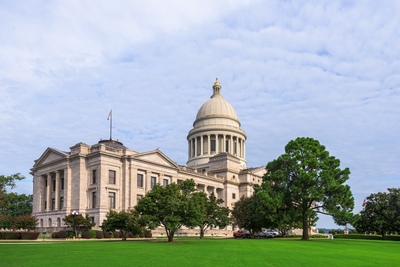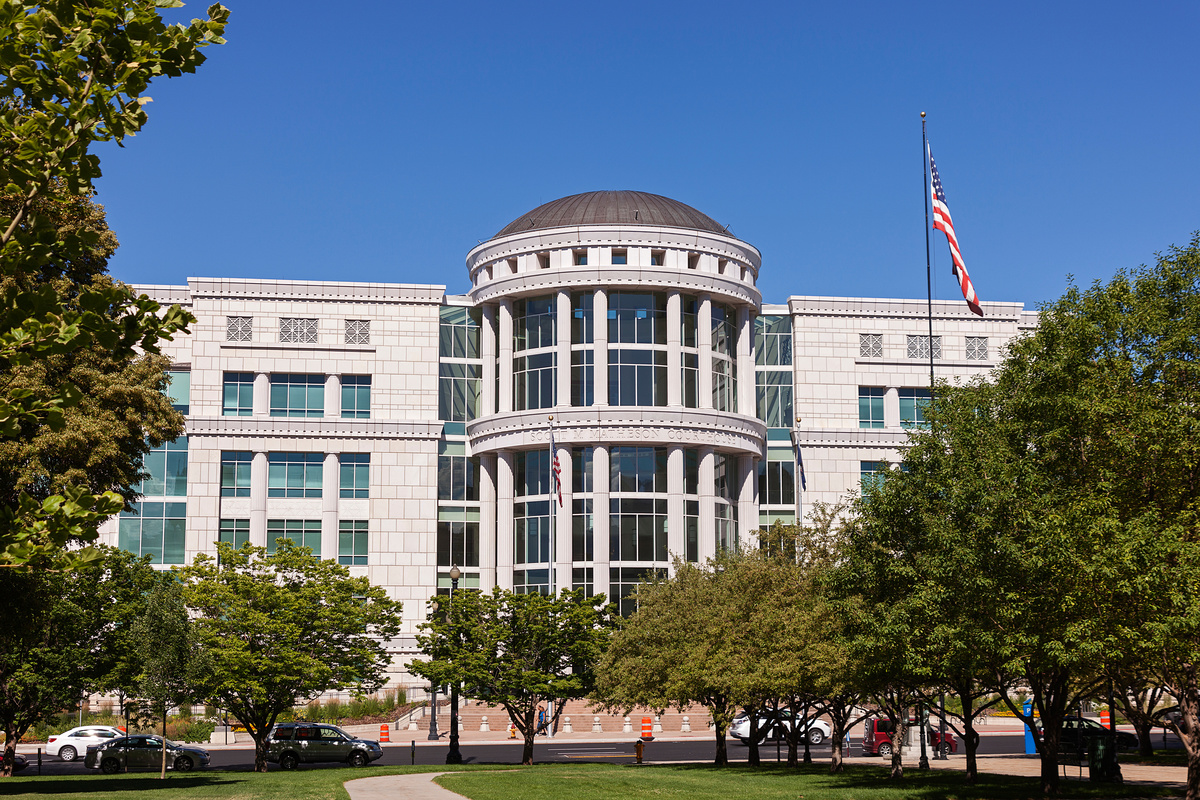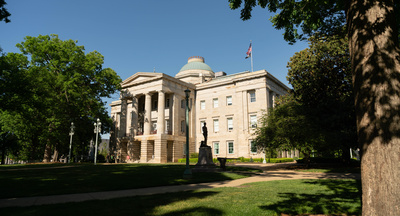
Elections & Campaigns
Legislation Addressing Foreign Influence in Elections Expanded Across Multiple States in 2025
January 23, 2026 | Andrew Jones
October 2, 2024 | Sandy Dornsife

Key Takeaways:
State high courts issue thousands of opinions each year, and these decisions can have major impacts on public policy. To help you keep track of consequential judicial decisions and their impact on state policy, MultiState publishes the Monthly Court Report, which offers a monthly recap of notable state high court decisions to provide a more dynamic picture of public policy trends.
Ballot initiatives play a significant role in determining the direction of some of the nation’s most contentious policies (read our previous coverage on this here). On average, one third of these measures are voter initiated constitutional amendments and statutes which allow the public to circumvent the legislature and enact laws and constitutional amendments through an election. The legislature’s authority to amend statutes, however, can lead to significant clashes between the intent of the people and the wishes of the legislature.
The state supreme courts in Michigan and Utah addressed cases that tested the balance between the intent of the public in crafting a measure and the authority of the legislature to make policy decisions.
In Michigan, the case began in 2018 when two indirect initiated state measures were put forward addressing a variety of labor issues, including minimum wage, tip credit, and sick leave. Unlike a direct citizen-initiated statute which is automatically placed on the ballot once a petition acquires the correct number of signatures, an indirect citizen-initiated measure is first presented to the legislature. The legislature then has a specified period of time to adopt the law, and then only if the legislature chooses not to act is the initiative placed on the ballot for voter approval. In Michigan, the legislature chose to exercise its option to adopt them, and as a result, they were not included in the November ballot. Soon after the election, however, the legislature gutted the statutes, essentially nullifying their provisions. Proponents of the original initiative immediately brought suit alleging that the legislature’s actions amounted to an attempt to reject the initiatives while also keeping them off of the ballot, denying voters the right to vote on the issues. In July, the Michigan Supreme Court agreed and ruled that the legislature’s adoption and amendment of the initiatives in the same session was unconstitutional, and in September, the Michigan Supreme Court issued a follow-up ruling clarifying how future rate increases for minimum wage and tip credit decreases would be calculated.
In recent months, the Utah Supreme Court has been asked similar questions regarding the power of the legislature to change voter initiatives and come to similar conclusions. In July, the Court affirmed that “the people’s right to alter or reform the government through initiative is constitutionally protected from government infringement including legislative amendment, repeal or replacement.” In September, the Court was asked to determine the validity of a ballot initiative that essentially granted the legislature the right to override voter-approved measures by drastically re-writing or repealing them. The Utah Supreme Court again sided with voter rights advocates and upheld a lower court injunction against the measure, agreeing that its summary was misleading, depriving voters of their right to “express their will.”
Approximately 160 statewide measures will appear on ballots this election cycle, providing ample opportunity for conflict between voters and the legislature. It would not be surprising to see many of these clashes end up in state courts throughout the country. The limited track record so far leans toward constitutional protection of public initiatives, but only time will tell how courts choose to weigh the rights of the people against the legislature’s power to make law.
The Arizona Supreme Court determined that approximately 98,000 Arizonans will not have their voter registration revoked, despite a clerical error that never confirmed their citizenship. The error occurred in 2004 when the law required proof of citizenship for voter registration which could be satisfied by a driver’s license issued after October 1996. Voters, however, with licenses issued prior to that date, and who had received replacement IDs were automatically deemed to have satisfied the requirement, despite not providing such proof. Read more.
Colorado’s Supreme Court held that Amazon must include “holiday incentive pay” in the calculation of “regular rate of pay” when determining overtime employee rates. Amazon had previously used only an employee’s base pay for such calculations. Read more.
The Colorado Supreme Court upheld the lifetime prison sentences for those convicted of felony murder, despite a recent law change capping such a conviction at 48 years. The Court determined that sentences issued prior to the law change in 2021 were constitutional and reasonable and cannot be modified. Read more.
Illinois’s Supreme Court ruled that a law enforcement officer may not perform a search of a vehicle based entirely on the detection of the smell of marijuana. The Court determined that the legalization of marijuana has made such a practice “insufficient to provide probable cause” for a search. Read more.
The Kentucky Supreme Court overturned a lower court judge’s decision to dismiss a jury because of a lack of racial diversity. The Court asserted that such an act undermines the jury selection process itself and would enable judges to impose their own individual standards of diversity, leading to inconsistent application of the law. Read more.
Massachusetts’s Supreme Court delivered a win for employers in the state, determining that an employee has no right to continue to accrue benefits while on Paid Family and Medical Leave Act leave (PFMLA). The Court held that while PFMLA specifically requires the continuation of health insurance, job restoration, and protection from retaliation, it does not include accrual of leave benefits. Read more.
The Michigan Supreme Court ruled that Robert F. Kennedy, Jr. would still appear on the state’s ballot in November. Despite arguments that leaving Kennedy’s name on the ballot would confuse voters, the Court determined that the ex-candidate had no legal right for the removal of his name; permitting the state to avoid the cost of a reprint. Read more.
Missouri’s Supreme Court confirmed that a proposed amendment to the state constitution establishing a fundamental right to reproductive freedom would appear on the state’s November ballot. Opponents of the amendment had argued that the measure did not specifically state that it would repeal the state’s ban on abortion and was therefore invalid. Read more.
The Nebraska Supreme Court joined other states in evaluating the validity of abortion ballot measures and determined that two competing abortion measures may appear on the state’s November ballot. One of the measures seeks to create a fundamental right to abortion with limited exceptions while the other bans abortions after the first trimester with limited exceptions. Read more.
New Hampshire’s Supreme Court ruled against a challenge to the use of ballot counting machines in the upcoming election. The Plaintiff had asserted that their right to equal protection entitled them, and other state voters, to execute a paper ballot during elections and to have that ballot counted by hand. The Court, however, found that the state constitution does not contain any requirement to hand count votes, and the legislature does not need to approve the use of ballot counting machines. Read more.
In contrast to Michigan’s decision, the North Carolina Supreme Court ordered that ex-presidential candidate Robert F. Kenney, Jr. be removed from that state’s November ballot. The Court held that the financial burden of reprinting the ballots was a justifiable cost to ensure the protection of citizens’ right to vote and not be misled by an inaccurate ballot. Read more.
Pennsylvania’s Supreme Court issued a major election decision in a case challenging the disqualification of ballots with incorrect or missing dates. The Court vacated the lower court’s ruling and dismissed the case entirely based on procedural errors. While this leaves the current practice of disqualifying these ballots in place, the opponents are permitted to resolve the procedural issues and refile. Read more.
The South Carolina Supreme Court ruled that the state’s Education Scholarship Trust Fund Act is unconstitutional as it distributes public funds to private schools. The Act permitted parents to apply for and receive educational scholarship funds that could be used towards “flexible education,” including services provided by private schools. Read more.
Wisconsin’s Supreme Court sided with lower courts determining that Robert F. Kennedy Jr.’s name could not be removed from the November presidential ballot. The Court asserted that state law clearly states that once a candidate files their nomination papers, they cannot be removed from the ballot unless they die. Read more.

January 23, 2026 | Andrew Jones

December 10, 2025 | Bill Kramer
-238a17-400px.jpg)
December 10, 2025 | Bill Kramer